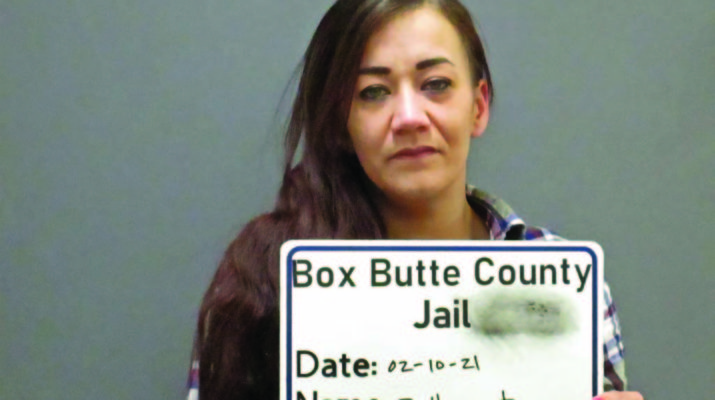Judge Travis O’Gorman sent a message to those distributing methamphetamine in the Panhandle in Box Butte County District Court on Wednesday: prepare for consequences.
On Wednesday, Savannah Bellecourt came before Judge O’Gorman to be sentenced in a case where she was found guilty of distributing methamphetamine, a class 2 felony.
According to court records, Bellecourt was originally charged with three felony counts: two counts of distribution of methamphetamine within 1,000 feet of a school, each a class 1D felony, and one count of distribution of methamphetamine, a class 2 felony. Each count occurred on Sept. 24, 2019, Nov. 4, 2019, and Sept. 25, 2019, respectively.
In a separate case, Bellecourt was charged with possession with intent to distribute, a class 2 felony, child abuse, a class 3A felony, possession of a controlled substance, methamphetamine, a class 4 felony, child abuse, a class 1 misdemeanor, possession of a controlled substance, THC, an infraction, possession of marijuana, an infraction, and possession of paraphernalia, an infraction.
Through a plea agreement, charges in the separate case were dismissed, as well as each of the counts of distribution of methamphetamine within 1,000 feet of a school. In exchange for the dismissal of the charges, Bellecourt agreed to plead no contest or guilty to the remaining count of distribution of methamphetamine.
During sentencing, Deputy County Attorney Travis Rodak said that determining a recommendation for a sentence was difficult in this case, noting improvement in Bellecourt’s behavior.
“Your honor, I struggle a little bit with this one,” said Rodak. “On the one hand, we have very serious conduct. We have this whole narrative of putting a bag of methamphetamine in a kid’s diaper, and stuff like that. We have a criminal history, although the most recent incident is 2014 for a similar type incident.
“It’s clear from the PSI (pre-sentence investigation) that Miss Bellecourt’s nemesis is substance abuse,” Rodak said. “That couldn’t be clearer. The other factors seem to be relatively low risk, but substance abuse is her biggest issue. On that note, we’ve got quite a bit of evidence, we’ve got support letters and stuff that says, ‘Hey, this person is actually clean. They’ve been clean for a somewhat significant time.’ And I think that’s pretty noteworthy, because, in terms of rehabilitation, her problem with substance abuse, she’s taken a lot of steps to control that and deal with that, and that’s helpful.”
Rodak said that in an associated juvenile case related to this one, Bellecourt successfully completed the case. He asked Judge O’Gorman, if he was considering a sentence other than incarceration, to implement a lengthy supervised probation to help keep Bellecourt on the right path.
“It seems like she’s doing a lot of the right things to be productive, to be a good member of society,” said Rodak.
Bellecourt’s attorney, Rebecca Chasek, agreed with Rodak’s assessment, noting the steps Bellecourt has taken to improve her situation and maintain sobriety.
“The biggest issue in Miss Bellecourt’s life has been sobriety, since the time she was 12 years old,” Chasek said. “That’s been coupled by a lot of abusive relationships, and an inability to earn for herself and falling in with the wrong crowd, relying on others for assistance who did not have her in mind while providing any kind of assistance to her.”
Chasek said in 2019 Bellecourt successfully enrolled and completed treatment before she was even appointed an attorney for this case. She also noted that she asked the Box Butte County Court for drug testing to prove that she was maintaining sobriety.
“She was able to remain sober, but for one occasion where she smoked marijuana,” said Chasek. “I think it’s quite clear that Miss Bellecourt is in the active stage of change.”
Chasek asked Judge O’Gorman to take those factors into account in sentencing Bellecourt, noting that she has taken steps to improve.
“She’s, frankly, done everything that was asked of her in the juvenile case, and is asking for a term of probation today,” Chasek said. “I think that the letters of support that you’ve received, including letters from various family support workers, as well as members of the police department here in Alliance indicate that she is who she says she is to probation. And, I’ve been able to watch her on her journey to sobriety in the past couple of years.”
When asked if Bellecourt had anything to say before sentencing, she noted that she takes responsibility for her actions and is remorseful.
Judge O’Gorman emphasized that the offense is not one to be taken lightly, noting the plague of methamphetamine-related cases in the Panhandle.
“We’ve got a real problem in the Panhandle with methamphetamine,” said Judge O’Gorman. “The cops are doing their job to try to combat that. Use is one thing: you’re only hurting yourself. When you’re spreading this throughout the community, you’re hurting others, and you’re adding to the problem, and that problem is out of control.
“You’ve got a lot of support,” Judge O’Gorman said. “I got a lot of letters. It seems that you are doing great rehabilitation wise, and that’s great. You should be proud of yourself for that. On the other hand, that’s only one component of sentencing.”
Judge O’Gorman noted that in sentencing there must be a punishment component, as well as a deterrent component.
“People who sell methamphetamine in the Panhandle need to know, if they get caught, and the cops do their job, and the prosecution does its job, and gets a conviction, that there’s going to be some serious consequences,” said Judge O’Gorman. “I think in this situation, despite how well you’ve done rehabilitation wise, anything less than a period of incarceration would depreciate the seriousness of the offense and promote a disrespect for the law.”
Judge O’Gorman sentenced Bellecourt to serve not less than four years and not more than six years in prison, with credit for three days served.

